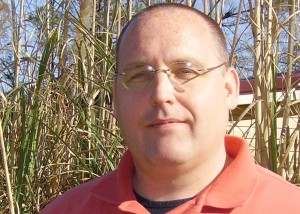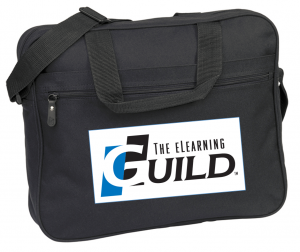What’s in Your Conference Bag? – Steve Howard
Welcome to a TWIST Blog Series – What’s in Your Conference Bag? This series explores the various ways people prepare for and get more out of a conference. Each week we’ll feature a new Learning and Development Professional who will answer a series of questions and share his or her personal tips for maximizing a conference experience.
 This week’s guest is Steve Howard, Manager of Technical Training Development for FireEye.
This week’s guest is Steve Howard, Manager of Technical Training Development for FireEye.
What you do: I manage a team of 6 IDs and 2 Developers/Designers who create Technical and Sales training for FireEye.
Where you do what you do: Silicon Valley – Milpitas
Something most people don’t know about you: Two for the price of one. I played clarinet at school. Very mediocre I was too.
In the late ‘80s I coached a great friend of mine in Power Lifting. She was Scottish champion in her weight class and was 3rd in the British championships and held Scottish records in each of the lifts.
One word that describes why you attend conferences: Seeds
Besides the conference-provided materials, what types of things do you carry in your conference bag?
Frankly, I never carry the conference bag. I’d be happy if I never got another one ever. I always arrive at the conference with my own laptop, tablet etc, so I carry those and any charger/battery support.
The one thing that is in most conference packages that I find truly valuable is the badge on the lanyard. Or, more to the point, the little pouch that is usually holding my ID badge. Those supplied by the eLearning Guild over the last few years are particularly good, because they have a pocket in which I keep a pen and any business cards that I collect during the conference.
What types of things do you do BEFORE a conference to plan and get more out of the experience?
I always review the schedule, looking for two specific things:
1 – sessions that interest me, especially if they have a new twist, or are topics that are new to me.
2 – sessions that I have no interest in whatsoever
The first group is obvious, these will be the sessions that I want to attend
.
The second group is less obvious. I have been attending conferences for almost 15 years. There are always lots of new and exciting ideas being shared, but sometimes there are times when there appears to be nothing new in the sessions at a particular time spot. During these times, I often attend sessions that are outside of my normal realm so that I can expand into new ideas that I might otherwise ignore.
What about AFTER a conference? What do you do to keep the learning going after the conference ends?
Haha – trick question? Networking continues. I make new friends all the time at conferences, then I chase them up in LinkedIn or Facebook or wherever they may have expressed is their favorite social networking site. I withdrew from Twitter about 3 or 4 years ago as my work responsibilities began to change, but Twitter used to be my best, most powerful resource for learning and networking. If I was still self-employed, Twitter would be my main follow-up tool.
What apps/tools/resources help you get the most out of a conference? (It doesn’t have to be technology)
The best resource, for me, is dinner. Seriously. The best way to meet people, learn about them, understand what they do and where their skills lie is to have dinner with them. And probably a couple of drinks in the bar after that.
Twitter is also an incredible resource at some conferences. When people are actively live tweeting, I can see and understand what is going on in other sessions, or see if others attending the same session agree with my perspective. It is also great to get a feel for which sessions are currently popular when I am looking for an alternative to that one session that I attend that is not what I hoped for.
Do you prefer to use a paper program guide for a conference or a dedicated conference app? Why?
Paper and my nose. Confession – I hate conference apps, so I never use them. I tend to find that they do not have a useful interface for me. I want to see a clear list of sessions/times in a calendar view, but it seems that most apps default to list views which are not helpful for me.
When traveling to and from a conference, how do you pass the time?
Music, surfing, reading books on my phone/tablet. And boy do I love it that I don’t have to turn these off on take-off now! I am typically very sociable when I am at the conference, but travel time is ‘quite time’, where I relax and ignore the world around me.
 What’s the most important thing you look to take away from a conference experience?
What’s the most important thing you look to take away from a conference experience?
New ideas. Which generate renewed energy. Which sustains me until the next conference.
What topics are you most interested in right now?
Security – well, that’s because of where I work. Mobile and wearable computing. When I first saw the MIT ‘6th sense’ demo years ago, it set my expectations for a future that has still not been realized.
Of course some of the technologies involved in setting this up have moved on since then, and my current expectations are even higher, yet I continue to be disappointed that the emergence of awesome that I am looking for is still ‘just around the corner’.
You’ve also been a speaker at conferences – What was it that first motivated you to speak at a conference?
In 2000 I went freelance and the very first thing I did, before I even began my first contract, was attend EuroTAAC, an Authorware conference in Utrecht, Netherlands. At this time I had been using Authorware for about 4 years, and had been very active on the Aware newsgroup. This was my first foray into Social Learning and Social Networking. I arrived at the conference knowing, and known by, easily 50% of the attendees.
As I browsed the conference sessions I noticed 2 things:
- None of the presenters were ‘professional’ presenters, and by this I mean they were all content writers and/or developers first, and presenters second. This meant that they all spoke ‘my language’ and the relatively unpolished presentations were overshadowed by the fantastic information that was shared freely.
- There were many topics being presented that I already knew well enough that I felt I had valid input to the resulting conversations during and after those sessions.
On their own, these were sufficient to motivate me to speak at future conferences, so I immediately began making applications to do so. However, a few months after I attended EuroTAAC, the team that ran the conference asked me if I would be interested in taking over the conference. After some consideration, I agreed and that launched my speaking career rather quicker than I had planned.
If you could give one piece of advice to someone attending a conference for the first time, what would it be?
Speak to the experts. They like to talk. They like to network. They like to make friends. Everyone in the industry is friendly and welcoming.
If you were to give a new attendee one task to complete that would define conference success, what would it be?
Personally thank the presenter of each session that you attend. Go up to him/her at the end of the session, shake hands, swap business cards, give thanks for the session and ask a question.
Does your employer financially support your attendance at a conference? If yes, how did you persuade your boss to approve you attending?
Over the years, I have been lucky enough to be sponsored many times to go to conferences, but not for each and every one.
Typically I attend conferences where I am speaking, which means the conference ticket is normally covered by the conference itself. In these cases I ask my employer to cover the following:-
- Salary – I don’t want to take PTO
- Hotel
- Flights
The order here is important, as the first is the most expensive and the last the least expensive. If there is any kind of push-back I am happy to negotiate. Usually push-back is about either budget or allocation of resources. I will happily pay flights and even hotel, but I strongly resist being asked to take PTO, because anything I learn at conferences will influence my future work.
There’s really only two concerns from leadership when I want to attend a conference:
- Will it impact your current projects?
- How much will it cost?
The first point is easy – of course it will not negatively impact current projects! If I think it might, then I make sure to put in the time and effort *before I leave* to ensure that I will be up to date on projects when I return. I give leadership whatever assurances necessary to clarify this point.
Usually I will offer to summarize, or in some other way report to the team, on the conference and what I learned. This adds value to the team not only by adding to my knowledge, but by disseminating it among the team.
Anything else you’d like to share?
Conferences are about people first, and information second. The most valuable time, for me, is after hours. The social time in the evening is when the real detail comes out on a topic – sessions are necessarily curtailed or simplified to appeal to a wider audience, leaving lots of room for in depth discussion later.
Networking is not only about meeting people and collecting business cards. It is about making friends. Conferences can spawn immediate and powerful, long-lasting friendships that add professional and personal value that is hard to measure. If you do not take the time to make and nurture those friendships, then you are missing out on years of future value that goes far beyond ‘that great session on mobile’.
Interested in being a guest for a future “What’s in Your Conference Bag post? Please reach out to David Kelly for details.

Leave a Reply